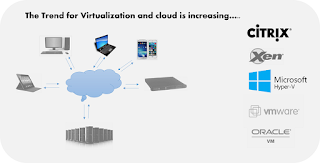Many small scale enterprises have also started to look into it to take benefits and save some cost for their IT infrastructure. Consider an example, if a small organization has 50 Physical servers running Windows Servers that may include Domain Controllers, application servers, SQL servers, web servers and other roles. There would be big cost for the underlying physical servers hardware and Windows licensing.
So, to take advantage of virtualization, they can save this cost and ease their manageability of IT infrastructure.
Windows 2012 R2 Standard Edition license cost you $882 per Device (this excludes CALs). So, if we take licensing into account it is going to cost an organization $44100. Now, consider an example of providing a virtualization solution to this organization.
They can procure two Windows 2012 R2 DataCentre Edition licenses which would cost them 2x $6155 = $12310. I have taken example of DataCentre Edition license because with this license you can run Hyper-V mode on physical server and host unlimited virtual machines. So, ultimately organization can scale their virtual environment in later run without having to invest any more money on Windows VM licenses.
However, if an organization is really small with upto 10 Windows servers and they can go with purchasing 10 Windows Standard licenses and can have Hypervisor role installed on 1 physical server to start with.
I have taken Microsoft Hyper-V into account as Hypervisor because this is free with Microsoft Windows 2012 R2 license and for smaller organization it doesn't make sense to invest big money on purchasing VMware, Citrix Xen or other industry Hypervisor solutions.
Many times we have been asked a question by IT Managers.
Is Virtualization answer to all the requirements for my business?
The answer depends upon the organization current Infrastructure and the requirements. My advise to everyone would be to ask some questions that can help them take this decision.
1) How many servers are you having in your IT Infrastructure? Does decommissioning of physical servers and moving to virtualization would save relevant hardware cost.
If you are running a project that would require you to procure and build 50 more servers and you decide to choose virtualization for your project. It is going to save money for you as you can purchase two physical servers and run Hypervisor on them to host 50 VMs. It again depends what Hypervisor you choose to go with and the budget of a project. However, in a longer run virtualization would always benefit you if planned well.
2) Does all the apps running on them support virtualization and run well in virtualized mode?
The answer to this question is yes from most of the vendors as the hypervisors have been developed and got more matured in last few years and rigorous testing have been performed on Enterprise applications to support them on virtual platform. However, if you have any in-house custom developed application, proper application compatibility testing and load testing should be performed as a part of POC solution.
3) Do you already have Enterprise storage solution running? If not you might need to procure one for building your virtual infrastructure.
If you have a very small IT Infrastructure; let's say 10-12 servers and you are thinking of taking advantage of virtualization. You better look at the storage solution for the infrastructure. Because, currently the environment might be running individual HDD on each server of 500 GBs (less or more). If the organization is looking to expand in near future, they must procure a Enterprise Storage solution from EMC, NetApp, HP, IBM etc.
4) Do you need Fault Tolerance and DR planning ?
Some small organization doesn't have DR sites and doesn't require DR site level redundancy. They are happy to live with HA and site level fault tolerance. However, if an organization is looking for DR sites and create better fault tolerant solutions, virtualization would be the definite answer for them.
5) The most Important - IT Budget
Do you have a required budget for the virtualization project. To get answer to this question, you should first research virtualization and have in-depth understanding of the software, hardware requirements including the cost requirements for your organization. You can also contact a advisor or consultant to help answer your questions before deciding on virtualization

No comments:
Post a Comment